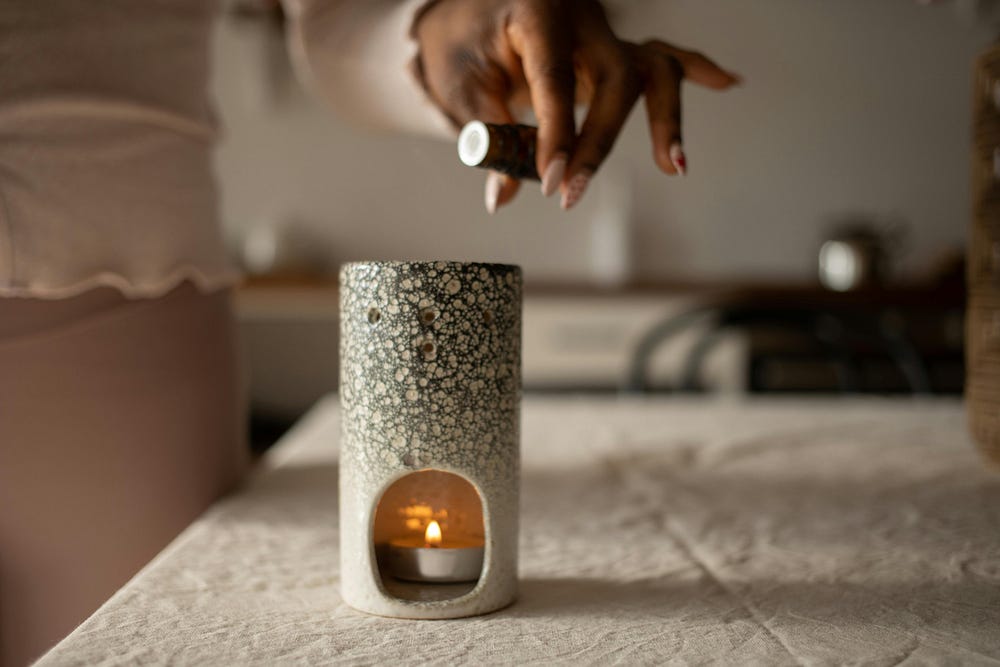Ditch the Pills
Get quality sleep naturally with these simple solutions.

Can’t seem to fall asleep, no matter how exhausted you are?
You’re not alone. Millions of people struggle with sleep, reaching for over-the-counter pills or prescriptions that come with potential side effects. But what if there were natural ways to improve your sleep without relying on pharmaceuticals?
This article explores a variety of sleep aids and alternatives designed to help you drift off peacefully and wake up feeling truly rested. Curious about how to get better sleep naturally? Let’s dive in.
Why Choose Natural Sleep Aids?

Choosing natural sleep aids over pharmaceuticals isn’t just about avoiding pills; it’s about promoting sustainable, quality sleep that leaves you feeling refreshed without the groggy side effects.
While pharmaceuticals can be helpful for short-term sleep issues, long-term reliance can lead to dependency, tolerance, and unwanted side effects like drowsiness or memory lapses. Natural remedies, on the other hand, work with your body’s rhythms to gently encourage relaxation and sleep, making them a safer choice for sustained use.
Imagine waking up with a clear head and renewed energy every day wouldn’t that be a nice change?
Natural sleep aids are particularly beneficial because they address the root causes of poor sleep, rather than simply masking symptoms. For example, many natural remedies, like herbal teas or magnesium supplements, work to calm an overactive mind and soothe physical tension, setting the stage for a restful night.
Others, like melatonin, work by aligning with the body’s internal clock, encouraging sleep at the appropriate time. These methods support a smoother transition from wakefulness to rest, helping you maintain a healthy sleep-wake cycle over time rather than depending on a quick fix.
Natural sleep aids focus on improving sleep quality by calming the nervous system, reducing stress, and encouraging the body’s natural production of melatonin. These holistic approaches not only help you fall asleep faster but also improve the depth and quality of your sleep, giving your body a chance to fully recover each night.
Unlike sleeping pills, which can disrupt the natural progression through sleep stages, natural remedies support a full, restorative sleep cycle. So, if you’re tired of quick fixes that don’t quite solve the problem, read on for lasting, natural solutions that help you wake up truly refreshed and recharged.
Herbal Remedies to Help You Unwind

Herbs have been used for centuries to promote relaxation and sleep, and some of these natural remedies are still among the best solutions out there.
Valerian root, for instance, is known for its sedative properties and can be taken as a tea or supplement to help reduce anxiety and promote sleep. Studies suggest that valerian can improve sleep quality by calming the nervous system, making it particularly beneficial for those who struggle with restlessness or a racing mind at night.
Chamomile tea is another timeless remedy, often used for its calming effects, making it a great choice for a soothing bedtime ritual. It contains an antioxidant called apigenin, which binds to receptors in the brain, promoting relaxation and easing you into sleep.
Other popular herbs for sleep include lavender, which has been shown to reduce stress and induce sleepiness, and passionflower, a mild sedative known to support healthy sleep cycles. Lavender is often used in essential oils or teas to help reduce anxiety and tension, creating a calm mental state ideal for drifting off.
Passionflower, on the other hand, is particularly effective for those dealing with insomnia linked to stress, as it can help to quiet the mind and support a more relaxed state. Even a simple ritual like sipping herbal tea in the evening can become a powerful cue for your brain, signaling that it’s time to relax. When combined with dim lighting or other calming bedtime activities, these herbal remedies can become a comforting part of your nighttime routine.
Have you tried any of these herbs before?
You might find they’re just what you need to end your day on a peaceful note.
The Role of Melatonin: A Natural Sleep Hormone

Melatonin is a hormone your body naturally produces to regulate the sleep-wake cycle, but factors like artificial light exposure and irregular schedules can throw off your natural rhythm. Melatonin levels typically start to rise in the evening as daylight fades, preparing your body for rest.
However, exposure to artificial light especially blue light from screens can suppress melatonin production, making it harder to fall asleep. This is where melatonin supplements can be helpful, particularly for people who experience occasional disruptions in their sleep patterns, like jet lag or adjusting to shift work. Taking a small dose about an hour before bed can support your body’s transition into sleep mode by mimicking the natural increase in melatonin levels.
However, melatonin is most effective when used sparingly. Unlike prescription sleep aids, melatonin doesn’t knock you out but rather signals to your body that it’s time to sleep. It’s a gentle approach, and when used properly, can help you fall asleep more naturally and deeply.
The key to effective use is to take the correct dose at the right time usually between 0.5 and 3 milligrams is enough for most adults.
Too much melatonin can lead to grogginess, vivid dreams, or even disrupt the body’s natural sleep rhythm, so it’s wise to consult with a healthcare provider to determine the right amount for you.
Using melatonin wisely can help reinforce your natural sleep cycle and make it easier to fall asleep and wake up refreshed.
Magnesium for Relaxation and Better Sleep

Did you know that magnesium, a mineral found in leafy greens, nuts, and seeds, plays a big role in sleep quality?
Magnesium helps your muscles relax, reduces stress hormones, and supports overall nervous system health, all of which contribute to better sleep. This mineral is also involved in the regulation of GABA (gamma-aminobutyric acid), a neurotransmitter that promotes relaxation and helps to quiet the nervous system. Low levels of magnesium have been linked to insomnia, anxiety, and poor sleep quality, which is why adding this essential mineral to your diet or supplement routine can make a noticeable difference in how well you rest.
Taking magnesium an hour or so before bed can help calm your mind and body, preparing you for a restful night.
Epsom salt baths, which contain magnesium sulfate, are another relaxing way to get your dose of magnesium as it’s absorbed through the skin, providing muscle relaxation and soothing effects.
Not only does magnesium promote muscle relaxation, but it also aids in deeper, more restorative sleep by supporting the body’s natural processes. For those struggling with sleep, adding a magnesium supplement or magnesium-rich foods like almonds, spinach, or pumpkin seeds to your evening routine might be the key to unwinding fully before bed. Next time you’re feeling tense or struggling to relax at bedtime, consider whether a little extra magnesium could make the difference.
The Soothing Power of Aromatherapy

Aromatherapy, especially with essential oils like lavender and chamomile, is a natural way to create a calm, sleep-friendly environment. Lavender oil, in particular, has been shown to slow down the nervous system, making it easier to relax and fall asleep.
Inhaling lavender has been linked to lower blood pressure, reduced heart rate, and an overall sense of calm, making it a perfect addition to your bedtime routine.
You can add a few drops of lavender or chamomile oil to a diffuser, spray your pillow, or even rub diluted oil on your wrists for a soothing scent as you drift off. Chamomile, another classic choice, is known for its gentle sedative effects, calming the mind and easing tension, which can make falling asleep smoother.
Other oils, like cedarwood and frankincense, are also known for their grounding, calming properties. Cedarwood contains compounds that have been shown to reduce anxiety, while frankincense has a warm, earthy aroma that helps deepen the relaxation response. Scent is a powerful signal to your brain, and by establishing a bedtime ritual with aromatherapy, you can reinforce the mental and physical cues that it’s time to wind down.
Creating an atmosphere with calming scents not only enhances the sleep environment but also trains your mind and body to associate certain scents with rest.
Have you ever tried using aromatherapy?
It’s a gentle, natural way to unwind and prepare your body and mind for a truly restful night’s sleep.
Lifestyle Changes for Lasting Sleep Quality

The way you prepare for sleep matters as much as any sleep aid. A consistent bedtime routine, free from screens and work stress, can make a world of difference. Limiting screen time an hour before bed is especially crucial, as the blue light emitted from devices can interfere with melatonin production and delay sleep onset.
Try setting aside 30–60 minutes before bed for quiet activities like reading, stretching, or meditation to help your mind unwind.
Consider creating a calming, screen-free bedroom environment that promotes relaxation, with low lighting and comfortable bedding. Small touches like blackout curtains, white noise machines, or an essential oil diffuser can help create an environment that’s both peaceful and sleep-friendly.
One powerful technique is deep breathing or guided meditation, both of which help reduce anxiety and slow your heart rate.
Practicing deep breathing, such as the 4–7–8 technique, signals to your body that it’s safe to relax, helping you drift off more easily.
Meditation, particularly mindfulness or body scan techniques, can also be highly effective for calming racing thoughts and letting go of the day’s worries.
By experimenting with relaxing activities that signal to your brain that it’s time to rest, you’re building a nightly routine that will set the stage for better sleep quality and a more balanced, relaxed mind. After all, good sleep habits are the foundation for natural, lasting rest.
Small lifestyle shifts like these may seem simple, but they can have a profound impact on your ability to enjoy deep, restorative sleep each night.
Exploring natural sleep aids can be a great way to find what works best for your unique needs. They offer gentle, non-habit-forming alternatives to pharmaceuticals, which means you can use them as part of a long-term solution.
What’s your current approach to sleep? Have you tried natural sleep aids before?
Sometimes it’s about finding the right combination of relaxation techniques, diet changes, and supplements that work for you. With some patience and consistency, you can discover what supports the best sleep possible.
Remember, this article is a general guide, so always consult your doctor before making significant changes to your sleep routine or trying new supplements. It’s essential to find the right balance for your body and health needs.
If you found this article helpful, please leave a comment, give it a clap, and share it with friends who might benefit from natural sleep aids. And don’t forget to follow me for more insights on health and wellness!
Too busy to read? You can also listen to this article on Vaughn’s Podcast, available on all major platforms.
Want More Health Tips?
If you’re interested in more ways to improve your health naturally, don’t miss these articles:👇
Learn how syncing with your body’s natural rhythms can improve sleep and overall health.
Discover foods that help fight inflammation and support optimal health.
And if you want regular health updates sent straight to your inbox, subscribe to my email list by clicking the email icon at the bottom of this story.📧
Comments
Post a Comment